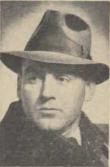'Tristram Clerring, a young man of independent means, satiated with the type of life he has been living, and suffering from the effects of an unsatisfactory love affair, seeks some panacea for the restlessness of his own spirit.
'He seeks it on a rough tramp steamer travelling from Sydney to London, in platonic friendship, and ultimately pursues it on a cruise on the Aegean Sea, among the strongholds of an ancient civilisation which he had studied and deeply admired.
'His caique is wrecked, and he finds himself cast up on an island, the entire population of which are lunatics, except for the doctors and staff at the settlement.
'This part of the story reveals very fine imaginative writing not devoid of irony, particularly in the case of the man, Adam.
'In Rosalind, niece of Dr. Dawes, one of the superintendents at the settlement, Tristram finds the answer to all the troublous searchings that had beset his mind and heart, and women will find his reflections on this conclusion to all his searching rather interesting.'
Source:
'Men ... Need Armour', Australian Women's Weekly, 29 December 1934, p.14.


